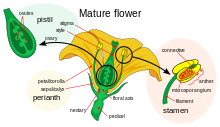Flower Parts

| This page has been nominated for cleanup for the following reason: formatting and grammar. Please edit this page to improve it. See this module's talk page for discussion. |
Reproduction is the basic feature of all the organisms present on earth. It is the only mode by which organisms continue their generation and hence life continues on earth. Plants are essential as they provide oxygen, food, shelter and various other necessary items required for the sustenance of life. Hence plants also reproduce. The reproductive unit which helps the flowering plants(angiosperms) to achieve the purpose of reproduction is the flower.
The flower is a very attractive part of a plant. Flowers can be found in various shapes, size, and colour. Its appearance varies from plant to plant. In the present world, use of flowers can be appreciated almost everywhere as decorating agents, medicine, fragrance, food, as names for newborns and so many other fields. Though, its major use is to carry out reproduction in plants.
A flower when dissected, carefully observed and studied, was found to be composed of the following parts-
1- VEGETATIVE PARTS
a) Calyx- The Calyx is the outermost whorl of a flower, single unit known as the sepal, and encloses the
flower in the form of a bud. It is generally small and green in color. In some flowers they
may be absent whilst in some others they resemble the petals. It helps in protection of the
developing bud.
b) Corolla- The colored and attractive part of a flower is the corolla, single unit known as petal.
They are the modified leaves surrounding the reproductive parts of the flower. They also
produce scent. Their bright colour and scent attracts pollinators, subsequently leading to
insect pollination.
In some flowers both the petals and sepals look the same and they both are called tepals. In some others, the petals may be absent wherein the sepals may be big and colorful and carry out the role of petals too.
2- REPRODUCTIVE PARTS
a) Androecium- Androecium is the male reproductive part of a plant and is made up of male
reproductive units called stamen. Stamen has two parts namely anther and filament.
Anther contains pollen which gives the male gamete. Filament holds the anther
firmly to the flower.
b) Gynoecium- Gynoecium is the female reproductive part of a flower which is also known as pistil.
Pistil consists of three parts namely stigma, style and ovary. The sticky surface
which is present at the top of the pistil is known as stigma. Its function is to trap and
hold the pollen on its surface. The middle elongated tube like structure is the style
which holds up the stigma and provides support. Style leads to the ovary which
contains ovules which are the female reproductive cells.

